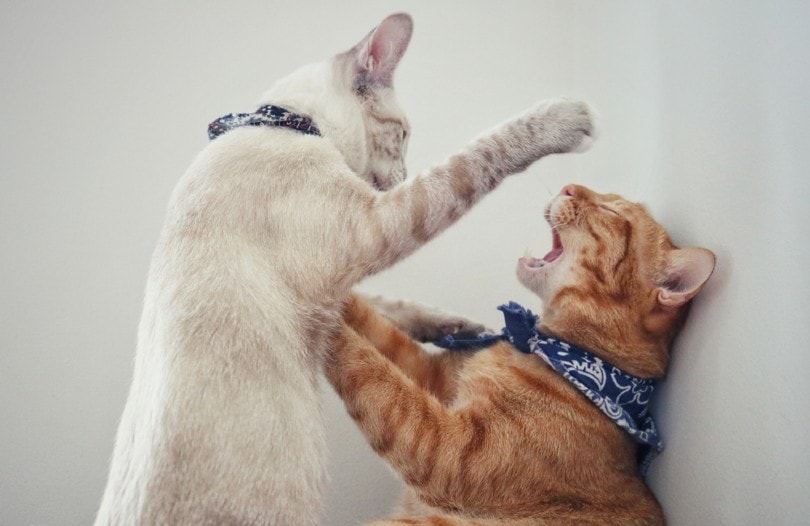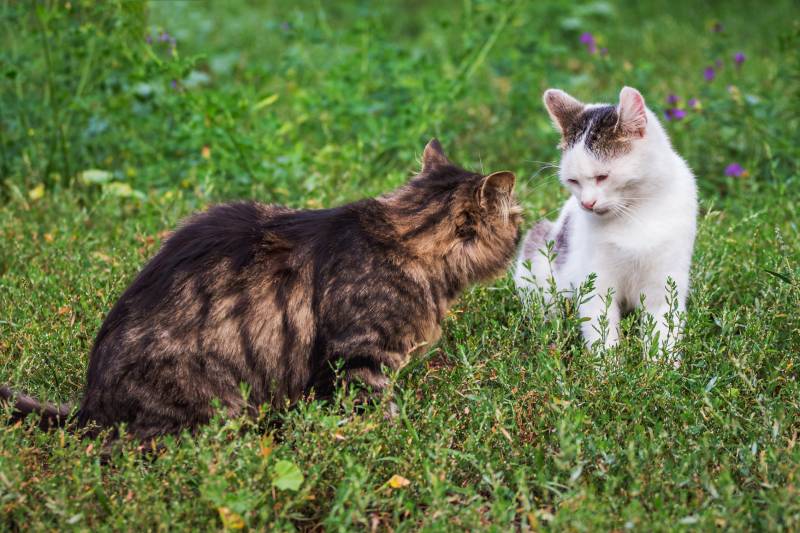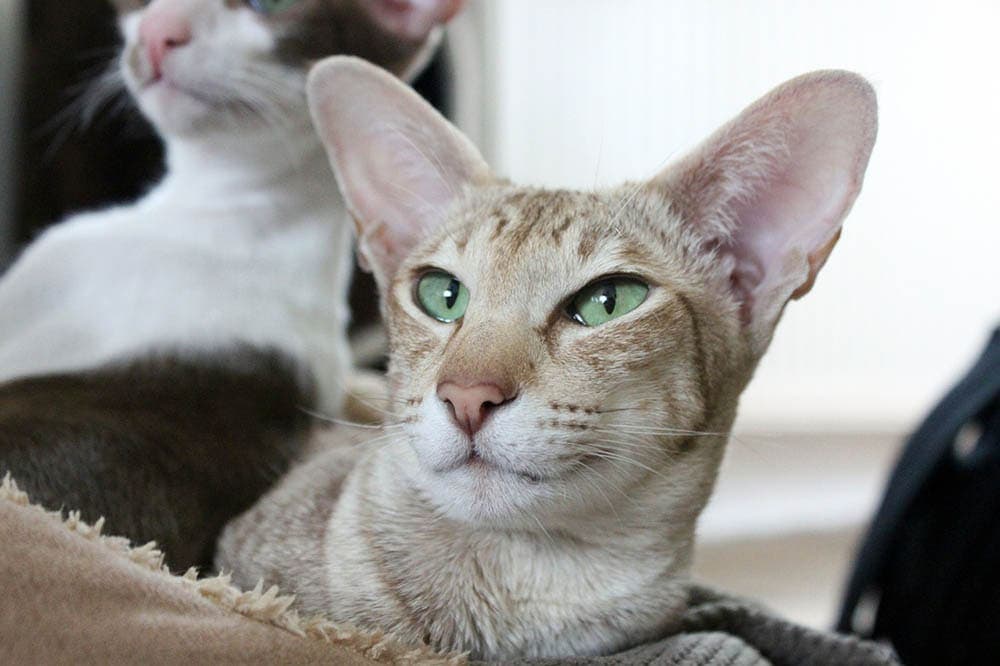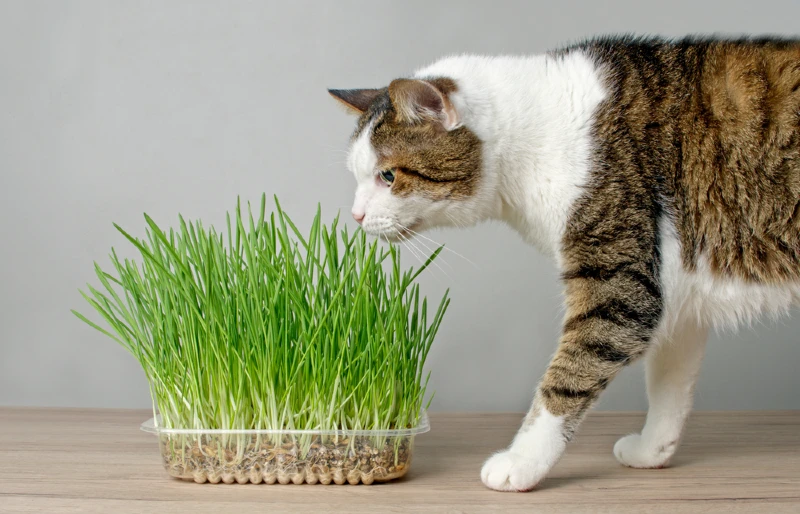My Cats Used to Get Along But Now They Fight (Here’s Why)
Updated on

Two or more cats can live in the same house and never disagree until one day, seemingly out of the blue, something happens and the fur flies. This leaves us pet parents wondering why our precious felines once got along but now do nothing but fight. What happened? Is something wrong? Oddly enough, there are several reasons your cats may suddenly be fighting. These can stem from age to boredom. Let’s take a look at a few reasons why your cats could be disagreeing and a few steps you can take to help get the situation back under control.
The 6 Common Reasons Cats Start Fighting
When your precious kitties stop getting along and the claws come out, breaking up the fight and separating the cats is a must. Once the cats are safe, it’s time for you, as the kitty parent, to try to determine what could be causing the hostility between your cats. While every situation is different, these common reasons cats start fighting are an excellent place to start getting to the root of the problem.
1. Age and Maturity
Whether your cats have grown up together or there is an age gap, things can change as they age. If you introduce a kitten into a home where an adult cat already lives, things may go well in the beginning. When the kitten reaches adulthood, however, conflicts could start to arise. When they’re young, kittens may love playing and annoying the adult cat in the house. Once they’re an adult and the young cat’s personality truly begins to emerge, they may not like the other cat as much. This can cause the cats to lash out at one another, especially if they feel the other is crowding them or leaving them with less space to thrive.
Senior cats can also see things differently when they get old. Your cat may have been the easiest-going kitty around, but as age sets in, their patience may wear thin. This is simply part of getting older. While the younger cat in the house may have been tolerable to them at one point, age, slowing down, and the need for peace could make a senior cat lash out at times.

2. Changes Around the House
Cats aren’t fans of change which may lead to them lashing out when something in their environment upsets them or causes anxiety. Now, as a cat parent, you most likely know this doesn’t have to be big changes. While yes, moving, having a new baby, or taking on a new roommate are stressors for cats they are also big deals so of course they can be stressful. But small things can also trigger stress and anxiety with your kitties. Perhaps you’ve rearranged your furniture or brought something new into the home. There could even be something outside that your cats are seeing that’s causing stress and making them lash out at one another.
3. Cats Are Territorial
While your cats may have started out as besties who shared everything, they are still territorial creatures. This means they enjoy their own space. Cats can also get very protective of things they consider theirs. If one cat is a huge fan of a certain sleeping spot or cat tree, and the other cat begins to show a lot of interest in it, a fight could take place. To keep things like this from happening, it’s important to make sure each cat has their own things. Add more space for them like cat trees, perches, litter boxes, and even separate food bowls. This will cut down on aggression over territory and allow each kitty in your home a place they feel safe.

4. Cats Need Stimulation
Contrary to popular belief, cats do more than sleep all day. If a cat has nothing to do around the house it will get bored and often act out. This could lead a cat to aggravate the other cats in the house in hopes of finding something to do. Always make sure your cats have toys, ways of exercising, and lots of enrichment. This will help avoid bad behavior and certain cats from becoming annoying siblings.
5. Cats Feeling Under the Weather
There are times when our cats simply aren’t feeling their best. Whether this be an underlying health issue or just a bad day, when they aren’t at the top of their game they can get aggressive or agitated easily. If you notice a change in your cat’s behavior, like disinterest in food, lowered activity levels, or issues in the litter box along with aggression, a trip to the vet is necessary. This can help you find out why your cat isn’t feeling its best and get things sorted before fights become a habit.

6. Roughhousing
By having more than one cat in the house, roughhousing is going to happen. While it may be comical to see your cats rolling around play fighting, there are times when it can get out of hand. These types of fights are going to happen from time to time. If possible, try to stop them before they start. If not, don’t let them continue. The last thing you want is for one of your kitties to get hurt or for the two of them to lose their connection over playtime that got out of control.
Will the Fights Ever Stop?
In most cases when cats fight, it’s only temporary. They may have a little scuffle, go to their separate corners, and then be cuddling a few hours later. However, there are instances where things happen and the cats show aggression each time they see one another. If this is the case at your house, your only option is to reintroduce the cats to one another. This process takes several weeks and requires dedication but could work.
You’ll begin by separating the cats into different areas where they can’t access one another. You’ll switch items like bedding and toys back and forth so they get the other cat’s scent. When feeding time comes, feed each cat on the opposite side of a closed door. Once your cats can eat at the door without growling or showing aggression you can work your way up to visual meetings and supervised visitation. If things continue to go well, the kitties should be able to coexist again.
Final Thoughts
It may be difficult to determine the exact reasons your cats have started fighting, but hopefully, it’s just temporary. The most important thing is to stop the fight as quickly as possible. The last thing you want is for one of your precious kitties to be injured. Loud noises or water bottles are great for this. Once the fight is over, you can try to determine what caused it and what you can do to help restore harmony in your home.
Featured Image Credit: RJ22, Shutterstock










